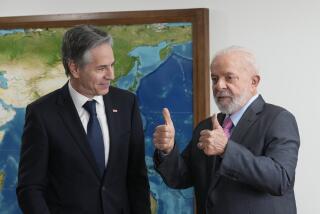World leaders gear up for G-20 and G-8 summits in Canada
Canadian Prime Minister Stephen Harper has been harshly criticized at home for the nearly $1-billion price tag of hosting overlapping summits of world leaders in Ontario this weekend.
Most of the money has been spent on the security measures deemed necessary to protect the leaders of 20 industrial and emerging economies who will gather in Toronto for two days starting Saturday. But some of the money has gone to more dubious investments, such as an artificial lake built for the media center, meant to convey a proper Canadian allure to the 3,700-strong global media posse that will not be allowed anywhere near the real lakeside retreat where leaders of the Group of 8 industrialized nations began their separate annual meeting Friday.
Harper better hope the charm pays off. The leaders gathering to offer their views on the best way to prop up the shaky global recovery risk sending a message of disunity and disarray by the time they adjourn Sunday.
The participating nations range from those that want to extend the spending spree they believe essential to spurring growth (the United States) to those suddenly alarmed by the power of financial markets to punish them for soaring debt levels (just about every country in Europe) to those enjoying a relatively solid economic growth (many emerging economies, especially in Asia).
A year ago, when the global financial meltdown threatened a corresponding economic collapse, the G-20 leaders gathered in London and pledged to work in concert to stimulate growth. That meant opening the taps for more than a trillion dollars in public spending and confidently predicting it would save jobs and increase output.
It also added trillions in new debt to government books in many parts of the world.
Despite facing a political backlash over the rising debt, the Obama administration remains committed to a policy of spend now, cut the deficit later. And the administration has urged its G-20 partners to do the same. In a letter to his fellow leaders released last week, President Obama warned against cutting back on spending before a full recovery takes hold.
The Europeans are no longer in the mood to listen. In recent months, they have hit a debt wall, forced into collectively bailing out Greece and watching the value of their common currency, the euro, sink. That pushed austerity to the top of the policy agenda, with several countries announcing — if not imposing quite yet — a series of spending cuts and tax hikes.
A few days ago, the newly installed British prime minister voiced concern about government borrowing and unveiled a budget that would dramatically reduce spending. Despite massive public protests, the French government has announced a series of tax hikes aimed at bringing its deficit under control, as well as pledging to raise the retirement age to 62, up from 60.
And German Chancellor Angela Merkel explicitly said Friday that leaders should trim deficits, setting aside concerns that this would slow or reverse the economic recovery.
“It is time to reduce the deficits,” Merkel said as she arrived in Toronto, reflecting her country’s historical revulsion for deep debt and the possibility of high inflation. “Europe has experienced what it means to have too-big deficits,” she said.
U.S. officials downplay the level of disagreement with the Europeans. The Obama administration says it is not asking countries to commit specific amounts of money to stimulus, and they point out that the president has argued all along that deficit reduction should be part of the recovery strategy.
The administration has promised to sharply reduce the U.S. deficit to more manageable levels once the recovery takes hold, though it has not said how it would do so. Obama reiterated that point during a working lunch in Muskoka on Friday, said a senior administration official, briefing reporters on the basis of anonymity. But the official added that the president also called on leaders to remain “committed to durable growth.”
Administration officials praised the G-20 process for its ability to get countries to focus on the need to cooperate.
“The process has already been successful,” White House economic advisor Lawrence Summers told the Times in an interview Friday. “In terms of the major international economic challenges, particularly as it relates to rebalancing global demand, a good deal of progress has taken place in the run-up to the meeting.”
Now the test will be whether, one year on, with the aura of crisis gone but many economies still in trouble, the same group of leaders can tailor policies that fit their nations’ interests without undermining one another.
“We need to act in concert for a simple reason,” Obama said Friday as he made his way to Ontario’s lake country. “This crisis proved, and events continue to affirm, that our national economies are inextricably linked.”
cparsons@latimes. com
Parsons reported from Toronto and Lee from Washington.
More to Read
Start your day right
Sign up for Essential California for news, features and recommendations from the L.A. Times and beyond in your inbox six days a week.
You may occasionally receive promotional content from the Los Angeles Times.







